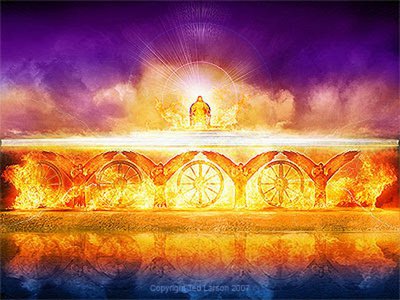Thoughts for the Day
Sunday, 7th July 2024: God calls again
Ezekiel 2 Prophet Word of God Ezekiel
Reading : Verses from Ezekiel, Chapter 2

In the thirtieth year, in the fourth month, on the fifth day of the month, as I was among the exiles by the river Chebar, the heavens were opened, and I saw visions of God. On the fifth day of the month (it was the fifth year of the exile of King Jehoiachin), the word of the Lord came to the priest Ezekiel son of Buzi, in the land of the Chaldeans by the river Chebar; and the hand of the Lord was on him there....
And I heard the voice of someone speaking. He said to me: O mortal, stand up on your feet, and I will speak with you. And when he spoke to me, a spirit entered into me and set me on my feet; and I heard him speaking to me. He said to me, Mortal, I am sending you to the people of Israel, to a nation of rebels who have rebelled against me; they and their ancestors have transgressed against me to this very day. The descendants are impudent and stubborn. I am sending you to them, and you shall say to them, ‘Thus says the Lord God.’ Whether they hear or refuse to hear (for they are a rebellious house), they shall know that there has been a prophet among them.
(Lectionary, New Revised Standard Version)
Thoughts
In the Church of England 'Common Worship Service Book' there is a lovely image about God and His people:
'You fashioned us in your image
and placed us in the garden of your delight.
Though we chose the path of rebellion
you would not abandon your own.'
(Eucharistic Prayer F)
We have been looking at the life of Samuel (1100-c1001 BCE) and at God's action in calling the prophet to deal with His rebellious people. But our Sunday reading now takes us 500 years later to the call of the prophet Ezekiel (c600-c550 BCE), and we see that God is still endeavouring to gain His people's attention. A number of them have been taken captive from Jerusalem to Babylon, and this includes Ezekiel. If the people didn't get the connection between the loss of the Ark of the Covenant to the Philistines, will they understand the message from God that the destruction of Jerusalem and the Temple will soon be destroyed by the Babylonians?
However, God has not abandoned His people, despite corrupt kings and false prophets, He will be heard through faithful prophets like Samuel and Ezekiel, and faithful people will listen to Him.
God says to Ezekiel "I am sending you ... to a nation of rebels ... and you shall say to them, 'Thus says the Lord God'." For a prophet is fundamentally someone who speaks on God's behalf. And the people shall know the validity of their claim, for 'if a prophet speaks in the name of the Lord but the thing does not take place or prove true, it is a word that the Lord has not spoken' (Deuteronomy 18.22). Ezekiel was not only to speak God's word, he was also frequently to act out his messages to the people.
The ultimate prophet though was to be Jesus who spoke God's word and acted out His message of love and compassion to His people. We are inheritors of his prophetic messages, but are we any less rebellious?
Prayer
Lord God Almighty,
we have a habit of picking and choosing
Your promises for our lives,
and of turning to You only when in dire need.
May we yearn to be with You on the sunny days
as well as on the stormy ones,
sharing our joys and our woes,
and praising You for Your glory.
Amen.
You might like to look at these two cartoon-videos on the book of Ezekiel: